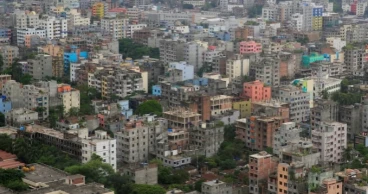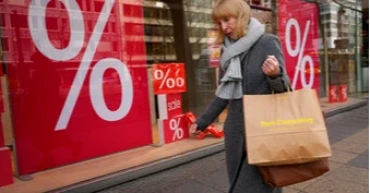cost of living
Cost of living in Dhaka increased by 11.08 percent in 2022: CAB
The Consumers Association of Bangladesh (CAB) said that the cost of living in the capital Dhaka increased by 11.08 percent in 2022.
The report released on Saturday said that around 17 products have directly contributed to the rise in inflation as well as the cost of living last year.
The urban lower-income group of people has compromised their diet chart and lifestyle due to the increase in the prices of essential commodities, fish and meat.
The report was presented on behalf of CAB by Mahfuz Kabir, research director of the Bangladesh Institute of International and Strategic Studies (BIISS).
Read More: Inflation report could show another month of cooling prices
According to the report, the cost of living in the capital increased by 6.88 percent in 2020 and 6.5 percent in 2019.
Dr Kabir has prepared the result, which was collected from 11 markets across Dhaka (Dhaka North and South City Corporation). It has covered 141 food items, 49 non-food items and 25 services.
Rice, flour, pulses, bakery products, sugar, fish, eggs, domestic poultry, edible oil, imported fruits, tea and coffee, local and imported milk, washing and personal hygiene items, and transport costs are included in the CAB price monitoring.
The CAB has proposed policy recommendations in the analysis of inflation trends. In the recommendations, the association said the government has increased support under subsidised food aid and social protection to reduce inflationary pressure on the poor and disadvantaged.
But the government should extend social protection schemes in urban areas to protect low and middle-income consumers from rising inflationary pressures.
Read more: Keep essentials' prices within reach: CAB
The government has significantly increased OMS activities during Covid-19, which has been extended further in 2022 to protect these consumer groups from the economic slowdown and inflationary woes.
But there is an inadequacy of food supply through OMS against extremely high demand and a lack of proper monitoring to ensure equitable distribution of OMS food products among low-income people.
The CAB recommendation has also opposed the decision to increase gas and fuel oil prices at the retail level as the bulk price hike of gas and oil would affect lower-income people.
CAB President Golam Rahman. Vice President SM Najer Hossain, General Secretary Advocate Humayun Kabir Bhuiyan, joint secretary Dr. Md. Shahnewaz Chowdhury, and Md. Qazi Abdul Hannan were also present at the press conference held virtually.
Read more: CAB urges govt to readjust edible oil prices
3 years ago
Europe's inflation slows again but cost of living still high
Europe ended a bad year for inflation with some relief as price gains eased again. While the cost of living is still painfully high, the slowdown is a sign that the worst might be over for weary consumers.
The consumer price index for the 19 countries that used the euro currency rose 9.2% in December from a year earlier, the slowest pace since August, the European Union statistics agency Eurostat said Friday. Croatia joined the eurozone on Jan. 1.
It was the second straight decline in inflation since June 2021. In November, the rate dipped to 10.1% after peaking at a record 10.6% in the previous month.
Households and businesses across Europe have been plagued by surging energy costs since Russia launched its war in Ukraine in February, which played havoc with oil and natural gas markets and have been the main driver of inflation.
The latest numbers indicate that the energy crisis may be easing for now. Energy price rises slowed to 25.7%, down from 34.9% in November and 41.5% in October.
Natural gas prices have slipped from all-time highs this summer as Europe has largely filled its storage for winter with supplies from other countries while warmer-than-usual weather has reduced fears of a shortage during the heating season.
Food price gains, the other big factor that's been driving up European inflation, held fairly steady. Prices for food, alcohol and tobacco rose at a 13.8% annual pace in December, a smidgen higher than the month before.
Read more: Europe’s inflation likely hasn’t peaked, says central bank chief Lagarde
Inflation also has been worsened by bottlenecks in supplies of raw materials and parts amid rebounding global consumer demand after COVID-19 pandemic restrictions ended.
“It is likely that the peak in inflation is behind us now, but far more relevant for the economy and policymakers is whether inflation will structurally trend back to 2% from here on,” said Bert Colijn, senior eurozone economist at ING Bank.
So-called core inflation, which excludes volatile food and energy costs, climbed to 5.2% last month from November's 5%, as prices rose for both services and goods such as clothing, appliances, cars and computers. Colijn and other economists said that means European Central Bank officials will likely roll out more interest rate hikes to get inflation back to their 2% target.
Soaring costs for energy and food have threatened a recession and fed labor unrest as wages fail to keep pace with the price rises. Across Europe, subway staff, hospital workers, train drivers, postal workers and air traffic controllers have gone on strike, threatening political turmoil.
In a sign that energy costs remain a worry for political leaders, French President Emmanuel Macron on Thursday urged energy suppliers to renegotiate what he called “abusive contracts” with small businesses to ensure “reasonable" price hikes.
Macron spoke to bakers gathered at the presidential palace for a traditional Epiphany kings cake ceremony, underscoring how energy and food prices are intertwined.
“Like you, I’ve had enough of people making excessive profits on the crisis," he said.
The French government has capped natural gas and electricity price hikes to 15% this year for consumers and some very small companies that don't use much energy. But more energy-intensive businesses, like bakeries, aren't covered, leaving some of them facing closure because they can't pay their bills.
While governments have offered relief on high energy bills, central banks are battling inflation by hiking interest rates.
Last month, the European Central Bank raised its benchmark rate by half a point, slowing its record pace of interest rate increases slightly but promising that more hikes are on the way. It matched actions taken by counterparts in the U.S., United Kingdom and elsewhere.
Read more: Record inflation puts the squeeze on Eurozone economies
“The eurozone economy is at best stagnating, and persistently strong core inflation means the ECB will feel duty bound to press on with its tightening cycle for a while yet,” said Andrew Kenningham, chief Europe economist for Capital Economics.
3 years ago



